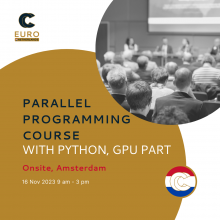Course/Event Essentials
Event/Course Start
Event/Course End
Event/Course Format
In person
Primary Event/Course URL
Training Content and Scope
Scientific Domain
Technical Domain
Level of Instruction
Intermediate
Advanced
Other
Sector of the Target Audience
Research and Academia
Industry
Public Sector
Other (general public...)
HPC Profile of Target Audience
Application Users
Application Developers
Data Scientists
System Administrators
Language of Instruction
Other Information
Organiser
Supporting Project(s)
EuroCC2/CASTIEL2
